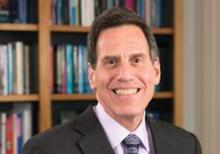Meanwhile, 3,000 or so physicians have signed on to a "Pledge of Non-Compliance" with the ABIM’s requirements. The pledge was organized by Dr. Paul Teirstein, chief of cardiology and director of interventional cardiology at the Scripps Clinic, La Jolla, Calif., and colleagues who have formed Physicians for Certification Change, an anti-MOC organization. Dr. Teirstein also launched a petition drive in March to overhaul the MOC process. That petition had about 18,000 signees at press time.
There are several other organizations hoping to derail or significantly change the ABIM’s requirements, including the Association of American Physicians and Surgeons, Change Board Certification, and Docs4PatientCare. In addition, many of the 26 professional societies, including AGA, whose members are certified by the ABIM, have been very organized in presenting their discontent.
The ABIM understands the frustration, said Dr. Richard Baron, ABIM president and chief executive officer, in an interview. "One of the things that people have said is that we’re not listening," he said. That is one reason why the ABIM decided to hold what he called a "listening session" on July 15. "We’re a learning organization," he added, noting that the ABIM will "continue to evolve the program," based on the feedback it receives from individuals and from professional societies, among others.
Dr. Baron also acknowledges that by presenting an entirely new MOC process this year, "our timing was not propitious." The ABIM outlined pressures on physicians in the July 28 letter, counting among them "dealing with the Affordable Care Act," fulfilling meaningful use requirements, and responding to changes in payment and practice models, including team-based care.
The ABIM is making a handful of changes to address some of the concerns, including "broadening the kinds of educational activities that can count for self-assessment of knowledge," said Dr. Baron. That is, the ABIM will be broadening the continuing medical education that will count toward the self-assessment of medical knowledge portion of the MOC requirements. Physicians must earn 100 MOC points every 5 years. At least 20 points must be self-assessment of medical knowledge and at least 20 points must be self-evaluation of practice assessment. The remaining 60 points can be either type of MOC.



